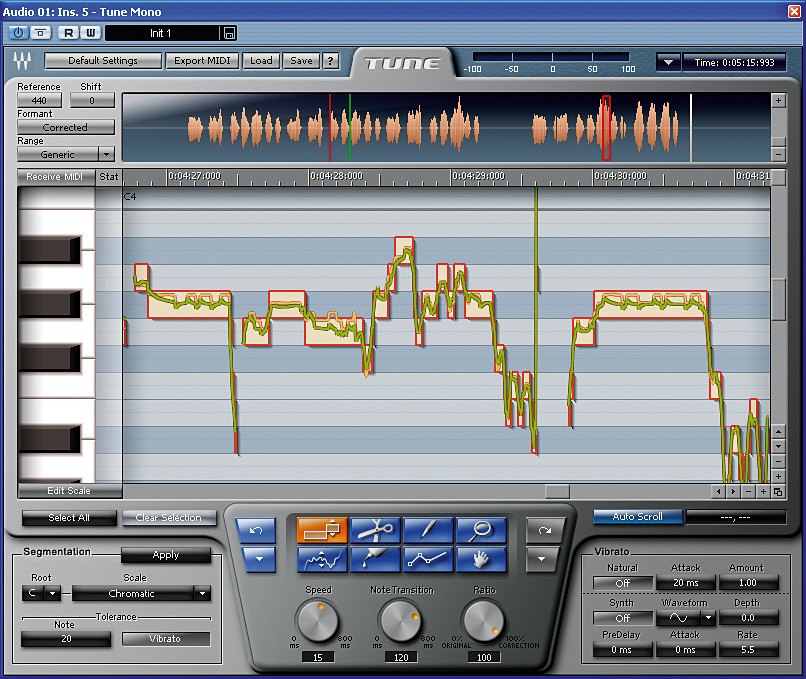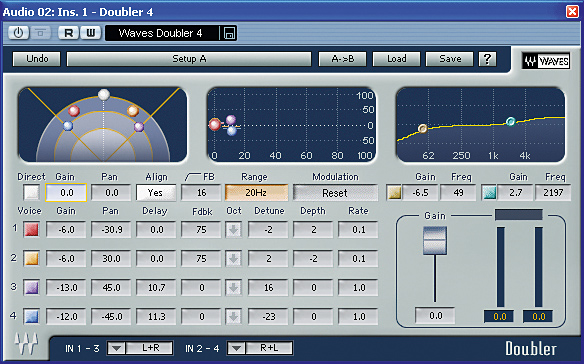MusicRadar Verdict
It may be pricey, but Tune alone is worth splashing out on.
Pros
- +
Amazing pitch correction in Tune. Intuitive user interfaces. Quality sonic performance. Tune available separately.
Cons
- -
Expensive.
MusicRadar's got your back

Waves Tune

Waves Doubler
Waves' Tune is the company's first foray into the world of professional pitch correction, and it's being aimed squarely at the lucrative Auto-Tune market.
It's available both as a standalone product and as part of the Waves Vocal Bundle that we're looking at here.
DeEsser
The most innocent-looking plug-in in the bundle is the Renaissance DeEsser. This is designed to eliminate the explosive top-end sibilant sounds that can result from using high-frequency equalisation on close-miked speech or vocal performances.
This tool works well - it has a semi-intelligent adaptive threshold parameter and basically does exactly what it says on the tin.
That said, if you're a Cubase SX user you'll already have the excellent Steinberg/SPL de-esser, which is sufficient in the vast majority of cases.
Doubler
The Doubler tool is hardly revolutionary, but in some ways that's its biggest strength. It combines an intuitive user interface with well-established modulation technologies to perform thickening tasks, and can be applied not just to backing and lead vocals, but also to the likes of guitars and keyboards.
The Renaissance Channel strip deserves a special mention. It may look like 'just' a combined EQ/ compressor - seemingly no different to those that are built into host applications such as Cubase, Logic and Sonar - but although its user interface might not be pretty or modern, the difference in sound quality when compared to built-in host equalisers is remarkable.
The sound is distinctly analogue (with none of the brittle top-end harshness that all-too-often characterises everyday digital sound processing), and it's hard to resist using it on every single channel of your mix.
DeBreath
The first of the new plug-ins is the innovative DeBreath tool. This uses two threshold controls - one based on sound level and the other based on a probability graph - to gate out the gasping noises that singers make before each line of a vocal. You can choose what to do with the gated breaths, though if you remove them all, the vocal can sound unnatural.
DeBreath works surprisingly well, although there are some types of breath noise that it fails to recognise. Nonetheless, this tool can be a real time-saver, especially if you're working with speech samples.
Tune
Finally, we come to the star of the show: Waves Tune. This is a high-end automatic pitch correction tool for use on vocals, and as we've already mentioned, is clearly designed to compete with Antares Auto-Tune.
Although you can use a MIDI keyboard to control the pitch in real time, the audio signal that you're correcting must be pre-recorded - this is because Tune needs to analyse the pitch before it can adjust it. Unlike similar plug-ins, though, this process is automatic, and if a section of audio hasn't yet been analysed, it will be the next time the section is played back.
Tune's interface is a joy to use. The screen in which you drag and drop pitch information is beautifully rendered and filled with classy touches, including animated zooming and soft drop-shadows under the pitch curves.
In terms of functionality, Tune is as complete as you could hope for and, amazingly, the controls for adjusting the musical scale - as well as items such as vibrato speed and depth - all work on a note-for-note basis. This means you have fully automatic control over every individual segment of a performance.
Although it is possible to get slightly better-sounding pitch correction with Celemony's Melodyne, that's really a more specialised type of tool. What you get with Waves Tune is something that's quick and easy to use, integrates seamlessly with your sequencer, and yet is fully-featured enough to carry out pretty much any vocal pitch correction task you could throw at it.
Summary
At £725, the Waves Vocal Bundle is certainly a costly package. However, you need to bear in mind that Waves concentrate on top sound quality and ease of use rather then snazzy features.
The Renaissance Channel, for example, doesn't look pretty but sounds wonderful. Doubler is quick and intuitive to use, and DeBreath cleans up vocal tracks in a fraction of the time it would take to do it by hand.
The icing on the cake, though, is Tune. It comes with a thorough set of editing tools and can produce very high quality results. Yes it's expensive, but the time it can save you makes it worth paying for.
Computer Music magazine is the world’s best selling publication dedicated solely to making great music with your Mac or PC computer. Each issue it brings its lucky readers the best in cutting-edge tutorials, need-to-know, expert software reviews and even all the tools you actually need to make great music today, courtesy of our legendary CM Plugin Suite.
With its latest free update, Ableton has finally turned Note into the app I always wanted it to be
Technically capable, but struggle to make your tunes sound musical? 5 simple music theory hacks to make your tracks stand out
"Despite its size, it delivers impressive audio quality and premium functions as well as featuring a good selection of inspired sounds": Roland GO:Piano 88PX review










